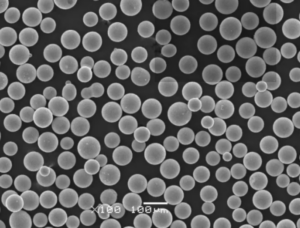CuAlNi-Pulvereine einzigartige Legierung aus Kupfer (Cu), Aluminium (Al) und Nickel (Ni), ist weithin bekannt für ihre beeindruckenden mechanischen Eigenschaften, ihren Formgedächtniseffekt und ihre Korrosionsbeständigkeit. Dieses vielseitige Material findet in verschiedenen Branchen Anwendung, von der Luft- und Raumfahrt bis hin zur Biomedizin. In diesem ausführlichen Leitfaden werden wir die Zusammensetzung, die Eigenschaften, die Verwendungszwecke, die Vorteile und die Grenzen von CuAlNi-Pulver untersuchen. Außerdem stellen wir spezifische Metallpulvermodelle vor, gehen auf detaillierte Spezifikationen ein und bieten einen umfassenden FAQ-Bereich zur Beantwortung häufig gestellter Fragen.
Überblick über CuAlNi-Pulver
CuAlNi-Pulver ist ein Legierungspulver auf Kupferbasis, das die einzigartige Synergie seiner Bestandteile nutzt, um ein Material mit außergewöhnlichen Eigenschaften zu liefern. Dieses Pulver ist für seine Hochleistungseigenschaften bekannt und wird besonders für seinen Formgedächtniseffekt geschätzt, der es ihm ermöglicht, nach einer Verformung bei bestimmten Temperaturen in seine ursprüngliche Form zurückzukehren.
Hauptmerkmale von CuAlNi-Pulver
- Zusammensetzung: Überwiegend Kupfer mit sorgfältig kontrollierten Anteilen von Aluminium und Nickel.
- Anwendungen: Verwendet in Aktoren, Sensoren, biomedizinischen Geräten, Komponenten für die Luft- und Raumfahrt und vielem mehr.
- Eigenschaften: Ausgezeichnete thermische und elektrische Leitfähigkeit, Korrosionsbeständigkeit und Verschleißfestigkeit.
- Form: In der Regel als feines Pulver mit einheitlicher Partikelgröße für präzise Anwendungen erhältlich.
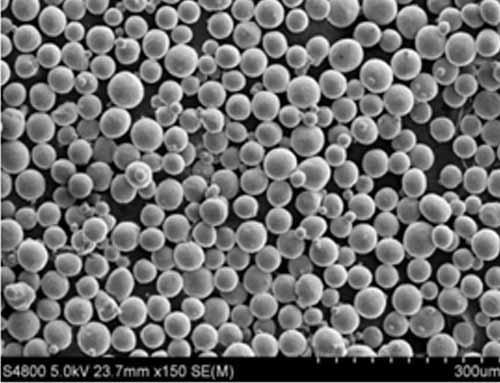
Arten und spezifische Modelle von CuAlNi-Pulver
Hier ein genauerer Blick auf bestimmte CuAlNi-Pulvermodelle, ihre Zusammensetzung und Anwendungen:
| Name des Modells | Zusammensetzung | Partikelgröße | Anwendungen |
|---|---|---|---|
| CuAlNi-10-20 | Cu (80%), Al (10%), Ni (10%) | 10-20 Mikrometer | Aktoren und Schalter mit Formgedächtnis |
| CuAlNi-15-10 | Cu (75%), Al (15%), Ni (10%) | 15-25 Mikrometer | Komponenten für die Luft- und Raumfahrt, Turbinenschaufeln |
| CuAlNi-20-15 | Cu (70%), Al (20%), Ni (10%) | 20-30 Mikrometer | Biomedizinische Präzisionsimplantate |
| CuAlNi-12-12 | Cu (76%), Al (12%), Ni (12%) | 5-15 Mikrometer | Mikroelektronische Sensoren |
| CuAlNi-Fein30 | Cu (78%), Al (12%), Ni (10%) | <10 Mikrometer | Hochpräzises Schweißen und Löten |
| CuAlNi-Grob50 | Cu (75%), Al (15%), Ni (10%) | 30-50 Mikrometer | Strukturelle Komponenten, Industrielager |
| CuAlNi-Super20 | Cu (72%), Al (18%), Ni (10%) | 10-20 Mikrometer | Intelligente Materialien in der Robotik |
| CuAlNi-Nano | Cu (80%), Al (10%), Ni (10%) | <1 Mikron | Fortgeschrittene Anwendungen der Nanotechnologie |
| CuAlNi-BioMed | Cu (75%), Al (15%), Ni (10%) | 10-15 Mikrometer | Biokompatible Implantate |
| CuAlNi-HighTemp | Cu (78%), Al (12%), Ni (10%) | 20-40 Mikrometer | Komponenten von Hochtemperaturöfen |
Zusammensetzung von CuAlNi-Pulver
Die Zusammensetzung von CuAlNi-Pulver hat erheblichen Einfluss auf seine physikalischen und mechanischen Eigenschaften. Schauen wir uns das mal an:
| Element | Prozentsatz (%) | Funktion |
|---|---|---|
| Kupfer (Cu) | 70-80 | Bietet Basisstruktur und Leitfähigkeit |
| Aluminium (Al) | 10-20 | Verbessert die Festigkeit und Korrosionsbeständigkeit |
| Nickel (Ni) | 10-15 | Einführung von Formgedächtniseigenschaften |
Variationen
Die spezifischen Verhältnisse von Aluminium und Nickel werden je nach den gewünschten Eigenschaften angepasst, z. B. höhere Formgedächtnisfunktionalität oder verbesserte Beständigkeit gegen extreme Bedingungen.
Eigenschaften und Merkmale von CuAlNi-Pulver
CuAlNi-Pulver ist für seine vielfältigen Eigenschaften bekannt, die es für anspruchsvolle Anwendungen geeignet machen.
| Eigentum | Beschreibung |
|---|---|
| Formgedächtniseffekt | Kehrt nach der Verformung bei Erwärmung in die ursprüngliche Form zurück |
| Korrosionsbeständigkeit | Gute Leistung in rauen Umgebungen, einschließlich Meeresumgebungen |
| Wärmeleitfähigkeit | Hervorragende Wärmeübertragungseigenschaften |
| Elektrische Leitfähigkeit | Effiziente elektrische Leistung |
| Mechanische Festigkeit | Hohe Zugfestigkeit und Haltbarkeit |
| Verschleißfestigkeit | Hervorragende Widerstandsfähigkeit gegen Abrieb und Verschleiß |
| Bearbeitbarkeit | Leicht zu verarbeiten und zu komplexen Formen zu formen |
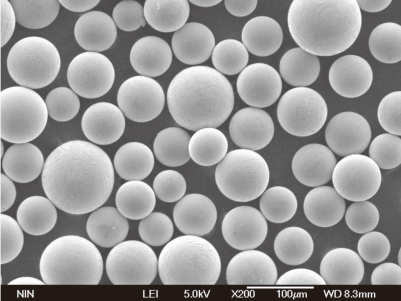
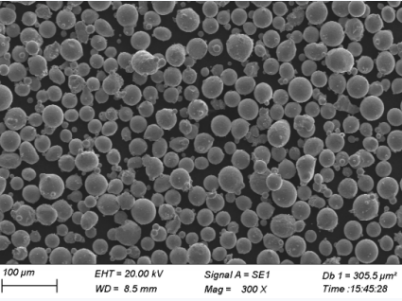
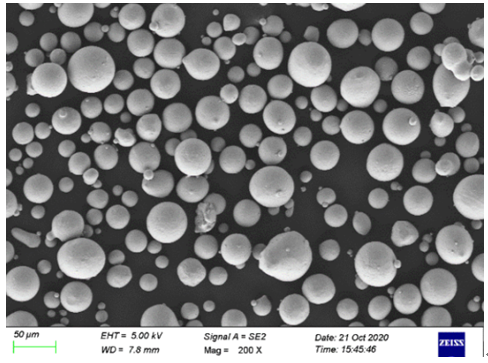
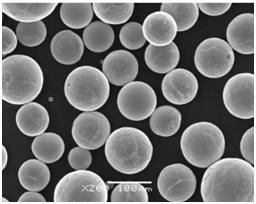
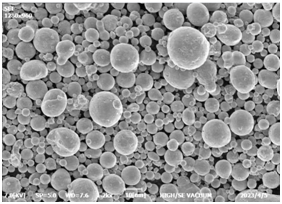

Anwendungen von CuAlNi-Pulver
CuAlNi-Pulver ist ein vielseitiger Werkstoff, der in zahlreichen Branchen Anwendung findet.
| Industrie | Anmeldung | Vorteile |
|---|---|---|
| Luft- und Raumfahrt | Aktuatoren, Turbinenschaufeln | Leichtes Gewicht, hohe Festigkeit |
| Biomedizinische | Implantate, chirurgische Instrumente | Biokompatibilität, Formgedächtniseigenschaften |
| Elektronik | Sensoren, Steckverbinder | Hohe Leitfähigkeit, präzise Leistung |
| Automobilindustrie | Motorkomponenten, Zahnräder | Abriebfestigkeit, Langlebigkeit |
| Robotik | Intelligente Materialien für Bewegungssysteme | Formgedächtniseffekt, Zuverlässigkeit |
| Marine | Korrosionsbeständige Komponenten | Lange Lebensdauer in salzhaltiger Umgebung |
Spezifikationen, Größen und Normen
In der nachstehenden Tabelle sind die wichtigsten Spezifikationen für CuAlNi-Pulver:
| Spezifikation | Einzelheiten |
|---|---|
| Partikelgrößenbereich | Nano (<1 Mikron) bis grob (30-50 Mikron) |
| Reinheit | 99.9% |
| Verpackung | Versiegelte Beutel, Vakuumbehälter |
| Normen | ISO 9001, ASTM B88 |
Lieferanten und Preisangaben
Hier sind einige beliebte Anbieter und Richtpreise:
| Anbieter | Region | Preisspanne (USD/kg) | Besondere Merkmale |
|---|---|---|---|
| PowderTech Metalle | Nord-Amerika | $80-120 | Anpassbare Partikelgrößen |
| AlNi-Lösungen | Europa | $90-140 | Biokompatible Sorten verfügbar |
| Global Alloy Powders | Asien | $70-100 | Hohe Mengenrabatte |

Vergleich von Vorteilen und Beschränkungen
| Aspekt | Vorteile | Beschränkungen |
|---|---|---|
| Kosten | Erschwinglich im Vergleich zu alternativen Legierungen | Geringfügig höher als bei reinen Metallpulvern |
| Vielseitigkeit | Breites Spektrum von Anwendungen | Begrenztes Angebot an Nischensorten |
| Formgedächtniseffekt | Einzigartige Eigenschaft, die nicht in vielen Materialien zu finden ist | Erfordert präzise Temperaturkontrolle |
FAQ
| Frage | Antwort |
|---|---|
| Wofür wird CuAlNi-Pulver verwendet? | Zu den Anwendungen gehören Aktuatoren, Sensoren, Implantate und Turbinen. |
| Wie funktioniert der Formgedächtniseffekt? | Beim Erhitzen kehrt das Material in seine ursprüngliche Form zurück. |
| Ist CuAlNi-Pulver teuer? | Die Preise liegen je nach Qualität und Reinheit zwischen $70 und $140 pro kg. |
| Kann CuAlNi in Meeresumgebungen verwendet werden? | Ja, aufgrund seiner Korrosionsbeständigkeit eignet es sich für solche Umgebungen. |
| Was sind seine wichtigsten Eigenschaften? | Korrosionsbeständigkeit, Festigkeit und Formgedächtniseigenschaften. |
